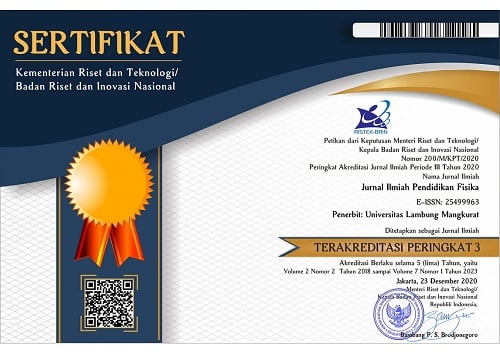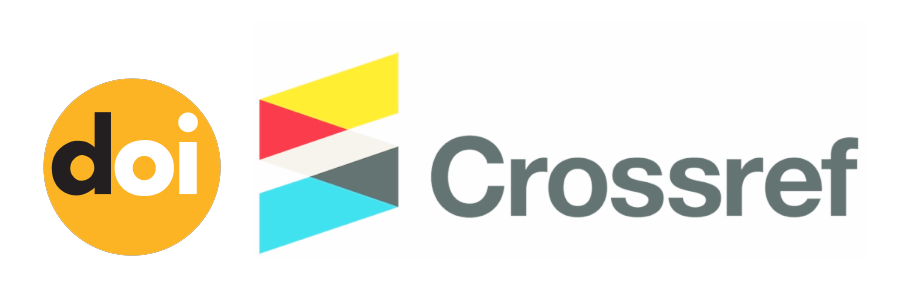Developing Worksheets Using Engineering Design Process to Promote Sustainable Development Goals for Pre-service Physics Teacher
Abstract
This research aims to design a worksheet using the Engineering Design Process (EDP) model to promote Sustainable Development Goals (SDGs) that are appropriate for pre-service physics teachers. The specific objectives of this study are to describe the validity of the worksheet and explore the pre-service physics teacher's response to the worksheet. The research design is research and development (R&D) with a model of analysis, design, development, implementation, and evaluation (ADDIE). The participants in this study were 45 pre-service science teachers. The research instruments are the worksheet validation sheet and the response questionnaire. The results show that the worksheet is categorized as very feasible. In addition, based on the pre-service physics teachers' responses, the worksheet is in a good category. It can be concluded that the developed worksheet using the EDP model is appropriate for learning.
Keywords
Full Text:
PDFReferences
Baharin, N., Kamarudin, N., & Manaf, U. K. A. (2018). Integrating STEM education approach in enhancing higher order thinking skills. International Journal of Academic Research in Business and Social Sciences, 8(7), 810-821
Dewi, I. S., & Jauhariyah, M. N. R. (2021). Analisis Bibliometrik Implementasi Pembelajaran Fisika Berbasis STEM pada Tahun 2011-2021. Jurnal Ilmiah Pendidikan Fisika, 5(3), 368. https://doi.org/10.20527/jipf.v5i3.3904
Ekantini, A., & Wilujeng, I. (2018). The Development of Science Student Worksheet Based on Education for Environmental Sustainable Development to Enhance Scientific Literacy. Universal Journal of Educational Research, 6(6), 1339–1347. https://doi.org/10.13189/ujer.2018.060625
Ferronato, N., & Torretta, V. (2019). Waste mismanagement in developing countries: A review of global issues. International journal of environmental research and public health, 16(6), 1060.
Handayani, I. G. A. K. R., Rachmi, G. A. K., Glaser, H., Monteiro, S., Kusumawati, E. D., Jaelani, A. K., & Najicha, F. U. (2019). Water availability in the framework of environmental justice: reconstruction of municipal waterworks (pdam) regulations. International Journal Of Business, Economics And Law, 20(4), 20-4.
Hartini, S., Mariani, I., Misbah, M., & Sulaeman, N. F. (2020). Developing of Students Worksheets through STEM Approach to Train Critical Thinking Skills. Journal of Physics: Conference Series, 1567(4). https://doi.org/10.1088/1742-6596/1567/4/042029
Khamhaengpol, A., Sriprom, M., & Chuamchaitrakool, P. (2021). Development of STEAM Activity on Nanotechnology to Determine Basic Science Process Skills and Engineering Design Process for High School Students. Thinking Skills and Creativity, 39, 100796. https://doi.org/10.1016/j.tsc.2021.100796
Krishna, Ilankumaran, Balakrishnan, Aute, & Patil. (2022). Knowledge, Perception, and Awareness about Sustainable Development Goals (SDGs) Among Students of a Public University in Indonesia. International Journal of Health Promotion and Education, 60(4), 195–203. https://doi.org/10.1080/14635240.2022.2066557
Kuncoro, W., Wahyuni, S., Suwandi, S. P., & Feditasari, E. D. (2020, February). The analysis of the causes of flood disasters and their impacts in the perspective of environmental law. In IOP conference series: earth and environmental science, 437(1), 012056. IOP Publishing.
Lu, Y., Song, S., Wang, R., Liu, Z., Meng, J., Sweetman, A. J., ... & Wang, T. (2015). Impacts of soil and water pollution on food safety and health risks in China. Environment international, 77, 5-15.
Mutakinati, L., Anwari, I., & Kumano, Y. (2018). Analysis of Students’ Critical Thinking Skill of Middle School through STEM Education Project-Based Learning. Jurnal Pendidikan IPA Indonesia, 7(1), 54-65
Melati, P., Yulkifli, & Fauzi, A. (2019). Validity of Student Worksheet Based on Problem Based Learning Model Assisted by Practical Tools with Digital Display. Journal of Physics: Conference Series, 1185(1). https://doi.org/10.1088/1742-6596/1185/1/012057
Norlaili, N., Al Huda, A. M., Yuliani, H., & Azizah, N. (2022). Literature Research: The Use of Science, Technology, Engineering and Math (STEM) In Physics Learning. Jurnal Ilmiah Pendidikan Fisika, 6(1), 45. https://doi.org/10.20527/jipf.v6i1.4153
Oyewo, O. A., Ramaila, S., & Mavuru, L. (2022). Harnessing Project-Based Learning to Enhance STEM Students’ Critical Thinking Skills Using Water Treatment Activity. Education Sciences, 12(11), 780. https://doi.org/10.3390/educsci12110780
Putra, P. D. A., Sulaeman, N. F., Supeno, & Wahyuni, S. (2023a). Exploring Students’ Critical Thinking Skills Using the Engineering Design Process in a Physics Classroom. The Asia-Pacific Education Researcher, 32(1), 141–149. https://doi.org/10.1007/s40299-021-00640-3
Putra, P. D. A., Sulaeman, N. F., Supeno, & Wahyuni, S. (2023b). Exploring Students’ Critical Thinking Skills Using the Engineering Design Process in a Physics Classroom. The Asia-Pacific Education Researcher, 32(1), 141–149. https://doi.org/10.1007/s40299-021-00640-3
Retnowati, S., & Subanti, S. (2020). The STEM approach: The development of rectangular module to improve critical thinking skill. International Online Journal of Education and Teaching, 7(1), 2-15.
Rizqiyyah, F. N., & Novita, D. (2022). Feasibility of Students Worksheets Using Conceptual Change To Remidiate Misconceptions on Chemical Bonding Material. JCER (Journal of Chemistry Education Research), 6(1), 1–7. https://doi.org/10.26740/jcer.v6n1.p1-7
Sithole, A., Chiyaka, E. T., McCarthy, P., Mupinga, D. M., Bucklein, B. K., & Kibirige, J. (2017). Student attraction, persistence and retention in STEM programs: Successes and continuing challenges. Higher Education Studies, 7(1), 46-59
Subagiyo, L., Nuryadin, A., Sulaeman, N. F., & Widyastuti, R. (2019). Water quality status of Kalimantan water bodies based on the pollution index. Pollution Research, 38(3), 536–543.
Sulaeman, N. F., Putra, P. D. A., & Kumano, Y. (2022). Towards Integrating STEM Education into Science Teacher Preparation Programmes in Indonesia: A Challenging Journey BT - Concepts and Practices of STEM Education in Asia (M. M. H. Cheng, C. Buntting, & A. Jones, Eds.; pp. 237–252). Springer Nature Singapore. https://doi.org/10.1007/978-981-19-2596-2_13
Sulaeman, N. F., Putra, P. D. A., Mineta, I., Hakamada, H., Takahashi, M., Ide, Y., & Kumano, Y. (2020). Engaging STEM Education for High School Student in Japan: Exploration of Perception to Engineer Profession. Jurnal Penelitian Dan Pembelajaran IPA, 6(2), 194. https://doi.org/10.30870/jppi.v6i2.8449
Suliyanah, S., Oktafina, R., & Deta, U. A. (2020). The Feasibility of Student Worksheet based on Collaborative Creativity to Improve Students Creative Thinking Skill. Berkala Ilmiah Pendidikan Fisika, 8(2), 91. https://doi.org/10.20527/bipf.v8i2.8094
Suwarno, D., Löhr, A., Kroeze, C., & Widianarko, B. (2014). Fast Increases in Urban Sewage Inputs to Rivers of Indonesia. Environment, Development and Sustainability, 16(5), 1077–1096. https://doi.org/10.1007/s10668-014-9514-0
United Nations. (2015). Sustainable Development Goals. UNDP.
United Nations. (2017). The Sustainable Development Goals Report 2017.
Wind, S. A., Alemdar, M., Lingle, J. A., Moore, R., & Asilkalkan, A. (2019). Exploring Student Understanding of The Engineering Design Process Using Distractor Analysis. International Journal of STEM Education, 6(1). https://doi.org/10.1186/s40594-018-0156-x
DOI: https://doi.org/10.20527/jipf.v7i1.7775
Refbacks
- There are currently no refbacks.
Indexed by: Jurnal Ilmiah Pendidikan Fisika is licensed under a creative commons attribution-share alike 4.0 international license
Statistics Counter |

















